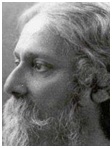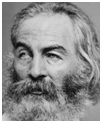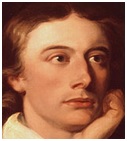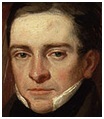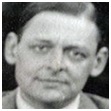|
 |
|
 |
|
|
||
Poetry - Learning and Wisdom
William Blake (1757-1827), The Fly
(1794) The English poet (pictured right) emphasizes the importance of thought:
If thought is life, And strength & breath, And the want Of thought is death;
Then am I A happy fly, If I live or if I die. (last two verses)
Rabindranath Tagore (1861-1941), Where The Mind Is Without
Fear
Where the mind is without fear and the head is held high Where knowledge is free Where the world has not been broken up into fragments By narrow domestic walls Where words come out from the depth of truth Where tireless striving stretches its arms towards perfection Where the clear stream of reason has not lost its way Into the dreary desert sand of dead habit Where the mind is led forward by thee Into ever-widening thought and action Into that heaven of freedom, my Father, let my country awake. (complete poem)
Walt Whitman (1819-92), Stronger Lessons (1867) Included in his collection of poems, Leaves of Grass, the American poet (pictured right) says that you can learn from anyone, friend or foe:
Have you learn'd lessons only of those who admired you, and were tender with you, and stood aside for you? Have you not learn'd great lessons from those who reject you, and brace themselves against you? or who treat you with Contempt, or dispute the passage with you?
Walt Whitman,Song of the Open Road (1867) This poem in the Leaves of Grass says that wisdom comes from the soul and life’s
experiences, not formal education: Here is the test of wisdom; Wisdom is not finally tested in schools; Wisdom cannot be pass’d from one having it, to another not having it; Wisdom is of the soul, is not susceptible of proof, is its own proof, Applies to all stages and objects and qualities, and is content, Is the certainty of the reality and immortality of things, and the excellence of things; Something there is in the float of the sight of things that provokes it out of the soul. (part of verse 6)
Whitman says a few lines later in verse 7 that the soul (and so wisdom) is enriched by “ever provoking questions”.
John Keats (1795-1821), Ode on a Grecian Urn
(1819) The English poet (pictured right) finishes the poem by emphasizing that beauty is vital to truth and wisdom: Beauty is truth, truth beauty,"—that is all Ye know on earth, and all ye need to know. (last two lines)
John Keats, Endymion (1818) In this poem Keats continues his praise of beauty:
A thing of beauty is a joy for ever: Its loveliness increases; it will never Pass into nothingness; but still will keep A bower [home] quiet for us, and a sleep Full of sweet dreams, and health, and quiet breathing. (first five lines)
A. E. Housman (1859-1936), When I Was One-and-Twenty
(1896) The English poet (pictured right) says that learning is difficult (particularly when you’re young) but worthwhile:
When I was one-and-twenty I heard a wise man say, "Give crowns and pounds and guineas But not your heart away; Give pearls away and rubies But keep your fancy free." But I was one-and-twenty, No use to talk to me.
When I was one-and-twenty I heard him say again, "The heart out of the bosom Was never given in vain; 'Tis paid with sighs a plenty And sold for endless rue." And I am two-and-twenty And oh, 'tis true, 'tis true”. (complete poem)
Thomas Hood (1799-1845), I Remember, I Remember
(1827) The English poet (pictured right) describes how difficult it is to learn and find wisdom as a child and an adult:
I remember, I remember The fir-trees dark and high; I used to think their slender tops Were close against the sky: It was a childish ignorance, But now 'tis little joy To know I'm farther off from Heaven Than when I was a boy. (last verse)
Piet Hein (1905-96),The Road to Wisdom The Danish poet (pictured right) says that wisdom depends on continuous learning from experience:
The road to wisdom? Well, it's plain And simple to express: Err and err and err again, but less and less and less. (complete poem)
Alfred, Lord Tennyson (1809-92), To
(1832) The English poet (pictured right) praises beauty, good and knowledge:
That Beauty, Good, and Knowledge, are three sisters That doat [dote] upon each other, friends to man, Living together under the same roof, And never can be sunder'd without tears. (selected four lines)
T.S. Eliot (1888-1965), The Rock
(1934) The American-born British poet (pictured right) distinguishes information from knowledge (wisely selecting relevant information to solve life's problems):
Where is the Life we have lost in living? Where is the wisdom we have lost in knowledge? Where is the knowledge we have lost in information? (selected lines)
T.S. Eliot The Dry Salvages (1941) In this poem Eliot says that saintly behaviour and wisdom come from love and self-sacrifice.
The point of intersection of the timeless With time, is an occupation for the saint - No occupation either, but something given And taken, in a lifetime's death in love, Ardour and selflessness and self-surrender. (selected lines)
Roald Dahl (1916-90),Television The English poet (pictured right) says that reading is much better for your brain than television.
Fear not, because we promise you That, in about a week or two Of having nothing else to do, They'll now begin to feel the need Of having something to read. And once they start -- oh boy, oh boy! You watch the slowly growing joy That fills their hearts. They'll grow so keen They'll wonder what they'd ever seen In that ridiculous machine, That nauseating, foul, unclean, Repulsive television screen! And later, each and every kid Will love you more for what you did. (last 14 lines)
Robert Browning Hamilton, Along the Road (1946)
The American poet says you can learn more from sorrow than pleasure.
I walked a mile with Pleasure; She chatted all the way; But left me none the wiser For all she had to say.
I walked a mile with Sorrow, And ne’er a word said she; But, oh! The things I learned from her, When sorrow walked with me. (complete poem)
T.S. Eliot (1888-1965), Little Gidding (the last of his Four Quartets) -
1942 The American-born British poet (pictured right) emphasizes the importance of inquiry and self-discovery: We shall not cease from exploration And the end of all our exploring Will be to arrive where we started And know the place for the first time. |
|
|
||
|
|
||
| Copyright © wisdomtowin.com 2025 All Rights Reserved | ||
|



